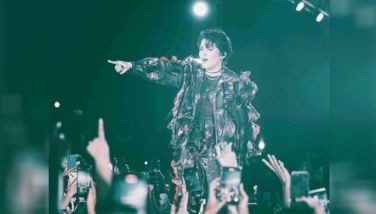An edgy thriller that goes the wrong way
November 16, 2001 | 12:00am
Somewhere in the first half or so Training Day is a taut, edgy thriller about how cops must sometimes do bad things in order to do their job. As LAPD Narcotics Det. Alonzo Harris, Denzel Washington brings more than his usual sly and menacing charm to the role of a cop who has learned how the streets work. As his rookie partner, Jake Hoyt (Ethan Hawke) has the mixed blessing of riding with Harris on the beat -a one-day life lesson referred to as his "training day" in which he witnesses firsthand how street justice works.
It’s not a pretty picture. In the wake of Rodney King, the LA Race Riots, and about a decade of political soul-gazing, the streets of modern Los Angeles are depicted as anything but improved. Latino and African-American neighborhoods are shown as loud, chaotic havens of crime, drugs and families under siege. It becomes clear early in the film that the one thing these people fear more than their neighbors or drive-by shootings is a visit by the LA police.
But in the beginning, Harris and Hoyt are shown drinking coffee in a diner, talking about the job. Harris is depicted as a street-savvy narc, wearing a black leather jacket, gold chains and a cross around his neck as he leads the greenhorn Hoyt out to his boosted Cadillac complete with low-rider gear and vanity plates. We, the audience, share Hoyt’s fascination with this foulmouthed detective who talks a blue streak and pulls his Magnum on anybody who gets in the way of his job. Antoine Fuqua directs the Denzel show with claustrophobic closeups and even tighter action sequences. Harris rides shotgun, not quite sure he’s chosen the right assignment, and watches as his black partner shakes down a VW Bug full of college kids, forces a pen down a suspect’s throat to retrieve vials of crack, and passes off a restaurant menu as a "search warrant" in order to roust a drug dealer’s wife in the ’hood.
All this seems like necessary force, at least for the first half of the film. As played by Washington (probably not in line for an Oscar this time - sleazebag roles hardly ever pay off in Oscars), Alonzo Harris is the anti-Shaft. He despises the black neighborhoods, and only ever goes out of his way to make a bust or a score. (Money confiscated during searches, he explains, can be used later for "buy-bust" operations on the streets.) He brags about the thousands of drug convictions he’s made in his career, and challenges Hoyt to turn down the assignment if he can’t hack it. (On one occasion, he forces Hoyt to smoke a confiscated pipe that turns out to be PCP in order to prove the rookie won’t blow his cover on the streets.)
In the wrong hands, this kind of performance would only evoke disgust. Usually in the movies, rogue cops come in two varieties: either they’re evil monsters who get people killed and fall in the end, or they’re lovably nihilistic thugs who get the job done (like Clint Eastwood’s Dirty Harry, Gene Hackman’s Popeye Doyle in The French Connection, or Russell Crowe’s Bud White in LA Confidential). Washington, much to his credit as an actor, manages to suggest both – at least for the first hour or so of Training Day.
Then something goes very wrong. As the cycle of brutality and questionable methods spiral out of control, it becomes clear that Harris is just one of many LAPD cops used to unscrupulous methods. In one scene, Harris meets with three other department heads in a bar, and it’s clear the LAPD is rotten to the core. Assassinations, payoffs, and other high-up mayhem is shown to be sanctioned by men wearing suits.
So far, so good. We have come to suspect that dirty cops exist, and even that corruption and racism are institutionalized in the LAPD. However, Training Day can’t solve the problems of the world in two hours. So it does what so many horror movies and Hollywood thrillers do: it projects all the sins of the LAPD onto one bad man – Alonzo Harris – turning him into a perfectly loathsome monster worthy of our hatred, and then pits the wide-eyed rookie Hoyt against him for the final showdown.
This is a shame, because what was initially interesting about Training Day – the dualism involved in handling a tough job, shown in Harris’s viperish charm and his reasonable arguments about "ends justifying the means" and needing to be "a wolf instead of a sheep" to catch crooks – all this rings true and is well captured in Washington’s complex performance. Complexity, though, most often gives way to our need to punish wrongdoers in Hollywood films of this sort. When Harris is abandoned in the black ’hood that was earlier depicted as threatening and unredeemed, the environment suddenly becomes a "community" that refuses to sanction his violence. Talk about Hollywood endings.
Training Day makes you long for more nuanced depictions of urban violence and law and order such as Traffic or Abel Ferrara’s The Bad Lieutenant, which was equally difficult to watch, but at least allowed its bad cop to reach for redemption within. Wait for the video instead.
It’s not a pretty picture. In the wake of Rodney King, the LA Race Riots, and about a decade of political soul-gazing, the streets of modern Los Angeles are depicted as anything but improved. Latino and African-American neighborhoods are shown as loud, chaotic havens of crime, drugs and families under siege. It becomes clear early in the film that the one thing these people fear more than their neighbors or drive-by shootings is a visit by the LA police.
But in the beginning, Harris and Hoyt are shown drinking coffee in a diner, talking about the job. Harris is depicted as a street-savvy narc, wearing a black leather jacket, gold chains and a cross around his neck as he leads the greenhorn Hoyt out to his boosted Cadillac complete with low-rider gear and vanity plates. We, the audience, share Hoyt’s fascination with this foulmouthed detective who talks a blue streak and pulls his Magnum on anybody who gets in the way of his job. Antoine Fuqua directs the Denzel show with claustrophobic closeups and even tighter action sequences. Harris rides shotgun, not quite sure he’s chosen the right assignment, and watches as his black partner shakes down a VW Bug full of college kids, forces a pen down a suspect’s throat to retrieve vials of crack, and passes off a restaurant menu as a "search warrant" in order to roust a drug dealer’s wife in the ’hood.
All this seems like necessary force, at least for the first half of the film. As played by Washington (probably not in line for an Oscar this time - sleazebag roles hardly ever pay off in Oscars), Alonzo Harris is the anti-Shaft. He despises the black neighborhoods, and only ever goes out of his way to make a bust or a score. (Money confiscated during searches, he explains, can be used later for "buy-bust" operations on the streets.) He brags about the thousands of drug convictions he’s made in his career, and challenges Hoyt to turn down the assignment if he can’t hack it. (On one occasion, he forces Hoyt to smoke a confiscated pipe that turns out to be PCP in order to prove the rookie won’t blow his cover on the streets.)
In the wrong hands, this kind of performance would only evoke disgust. Usually in the movies, rogue cops come in two varieties: either they’re evil monsters who get people killed and fall in the end, or they’re lovably nihilistic thugs who get the job done (like Clint Eastwood’s Dirty Harry, Gene Hackman’s Popeye Doyle in The French Connection, or Russell Crowe’s Bud White in LA Confidential). Washington, much to his credit as an actor, manages to suggest both – at least for the first hour or so of Training Day.
Then something goes very wrong. As the cycle of brutality and questionable methods spiral out of control, it becomes clear that Harris is just one of many LAPD cops used to unscrupulous methods. In one scene, Harris meets with three other department heads in a bar, and it’s clear the LAPD is rotten to the core. Assassinations, payoffs, and other high-up mayhem is shown to be sanctioned by men wearing suits.
So far, so good. We have come to suspect that dirty cops exist, and even that corruption and racism are institutionalized in the LAPD. However, Training Day can’t solve the problems of the world in two hours. So it does what so many horror movies and Hollywood thrillers do: it projects all the sins of the LAPD onto one bad man – Alonzo Harris – turning him into a perfectly loathsome monster worthy of our hatred, and then pits the wide-eyed rookie Hoyt against him for the final showdown.
This is a shame, because what was initially interesting about Training Day – the dualism involved in handling a tough job, shown in Harris’s viperish charm and his reasonable arguments about "ends justifying the means" and needing to be "a wolf instead of a sheep" to catch crooks – all this rings true and is well captured in Washington’s complex performance. Complexity, though, most often gives way to our need to punish wrongdoers in Hollywood films of this sort. When Harris is abandoned in the black ’hood that was earlier depicted as threatening and unredeemed, the environment suddenly becomes a "community" that refuses to sanction his violence. Talk about Hollywood endings.
Training Day makes you long for more nuanced depictions of urban violence and law and order such as Traffic or Abel Ferrara’s The Bad Lieutenant, which was equally difficult to watch, but at least allowed its bad cop to reach for redemption within. Wait for the video instead.
BrandSpace Articles
<
>
- Latest
- Trending
Trending
Latest
Trending
Latest
Recommended
































